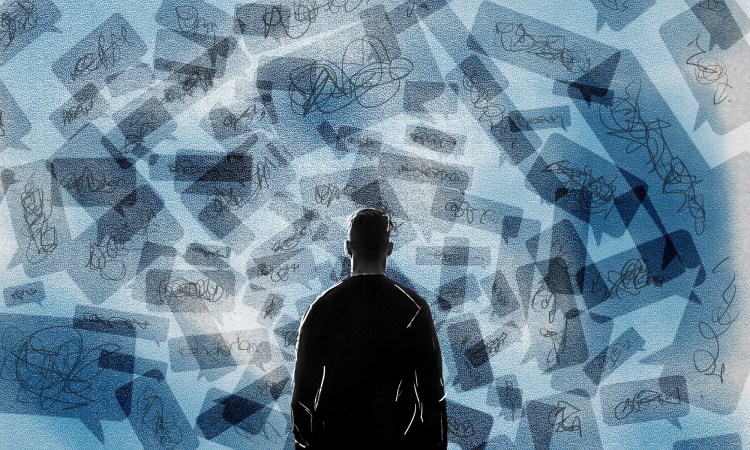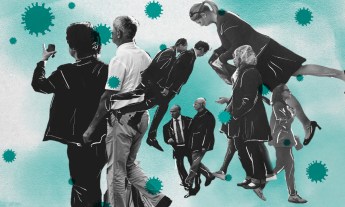
Welcome to “Dear Guy,” TED’s advice column from psychologist Guy Winch. Twice a month, he’ll answer your questions about life — about your relationships, your job (or jobs), your family (or families), your passions, fears and more. Please send your questions to dearguy@ted.com; to read his previous columns, go here.
Dear Guy,
I am an international post-graduate student currently residing in China. I got caught here during the coronavirus outbreak in January. We have been in lockdown for almost two months now and are not allowed to go out of the campus as a preventive measure implemented by the University. Before coming here, I was pursuing an M.A. in Clinical Psychology in the Philippines.
The situation we have right now is very depressing for most of my fellow students and I am trying to toughen it out for them. Sometimes, people will call me to talk about their situation and how depressed and anxious they are. I attend to these students but it is very exhausting to do it each and every day and I know I’m developing emotional fatigue.
Should I stop doing peer counseling? I am quite worried about my emotional state, but I also believe it is morally wrong to stop. What should I do?
Sincerely,
Jack
Editor’s note: This letter was edited for length and clarity.
Dear Jack,
China’s citizens and foreign expats (like you) have been dealing with Covid-19 longer than others in the world. Your experiences offer the rest of us an opportunity to learn from your struggles and triumphs — the hardships of strict lockdowns, the stresses of being isolated from friends and family, and the capacity to set aside one’s own fears, worries and emotional distress to comfort those who need it.
I chose your letter because your story is being repeated all over the world. As shutdowns blanket the globe and anxiety and grief rise, regular people — often with no-to-little mental health training — are assuming roles similar to the one you have taken on, becoming the person to whom others turn to for emotional support. You and every other unofficial emotional support provider (ESPs) around the world are making a significant contribution to the efforts against the pandemic. This is critically important work since Covid-19 will impact the physical health of some but the emotional health of all.
Because you are so needed, it’s even more vital for you to learn how to manage the difficult balance of being there for others while making sure you don’t deplete your own reserves in the process. And yes, feeling significant “emotional fatigue” is an indication that you’ve been doing too much support work and are currently out of balance.
When I started working as a therapist and mental health professional years ago, I had to develop my own guidelines for avoiding burnout. I want to share those with you and all the other ESPs out there:
1. Know your limits
When I started my private practice, I was super-motivated but I quickly became burnt out because I was working too many hours and then ruminating about work too much in the off hours. So I decided to do something about both. You can learn my tips for managing rumination here. More importantly, I began to monitor how I felt after each session — or in your case, each chat or conversation. I realized there was a certain point in the day at which the idea of another session elicited a pang of resentment and a touch of dread. I say “pang” and “touch” because these visceral sensations were of such low intensity that I might not have noticed them had I not paused to ask myself how I was feeling in the moment. However small a blip those feelings evoke in you, they represent a good indication that you’re at capacity and that further emotional support work will make you exceed this capacity.
Try to check in with yourself after each “session”. At the point when you feel a pang, twist or touch of unease, stop your unofficial duties for the day. Which brings me to the next guideline.
2. Manage your guilt
Jack, what motivates you and other ESPs is your compassion, empathy and conscientiousness. Those admirable qualities are likely to make you feel guilty when you come across other people in need yet refrain from helping because you’ve reached your daily capacity. Indeed, when you write, “Should I stop doing peer counseling? I am quite worried about my emotional state, but I also believe it is morally wrong to stop,” you’re clearly wrestling with this issue.
I admire your sense of morality but you need to widen your time perspective. The more relevant question to ask yourself is: “Is it wrong to pass up supporting one or two people in a given day so I can keep supporting many more in the days to come?”
In other words, this pandemic is a marathon not a sprint, so you must conserve your emotional energy and make sure you don’t hit a wall too early in the race. It also means you have to learn which people or issues deplete you more than others:
3. Recognize your vulnerabilities
We all have our own issues and emotional vulnerabilities — that means some situations are going to be more emotionally taxing for us than they might be for someone else and vice versa. For example, if you have your own issues with grief, supporting a grieving person might be far harder and emotionally depleting for you than supporting an anxious one. If a single chat at the beginning of a day takes a lot out of you, then you should stop doing emotional support work for the rest of the day.
Remember: The goal here is not to do as much as possible in a single day but to do as much as you can without getting burnt out. That said, how exactly do you say no to a person in need?
4. Let them down easy
Once you’ve reached capacity for a given day and people continue to text or call you to chat, say “I’m sorry, but I’m a little preoccupied right now and I need to do some yoga/meditation (or another form of self-care). I want to be able to talk to you when I’m fully present. Is it okay if we chat tomorrow? I’ll be in touch.” Of course, rephrase this in your own words. The idea is to reassure them that you are still interested in talking to them and that you’ll even follow up. Suggesting you need to practice emotional self-care is a reminder to both you and them of how vital it is to do so during periods of chronic stress and anxiety.
5. Practice self-care
Supporting others will deplete your emotional reservoir, which is already depleted as a result of living through a global pandemic. The best way to practice self-care is to do the things that you find emotionally nourishing. For some, it might indeed be yoga or meditation. For others, it’s a hobby or activity that makes you feel like you. For me, that’s writing. Generally speaking, any activity in which you become so absorbed that you lose track of time should help replenish your reservoir.
The obvious heroes of this pandemic are the health professionals who are risking their lives on the front lines of patient care, the first responders, the transit workers, the delivery people, the people who are staffing grocery stores and providing other essential goods and services. I hope those around you — and around all those who provide “unofficial” emotional support to others — recognize your efforts and realize you too are among the many heroes that this crisis will create.
Stay healthy in mind and body,
Guy
Send your pressing questions about life — about your relationships, your job (or jobs), your family (or families), your passions, fears and more — to dearguy@ted.com
Watch Guy’s TED Talk on emotional first aid now:











